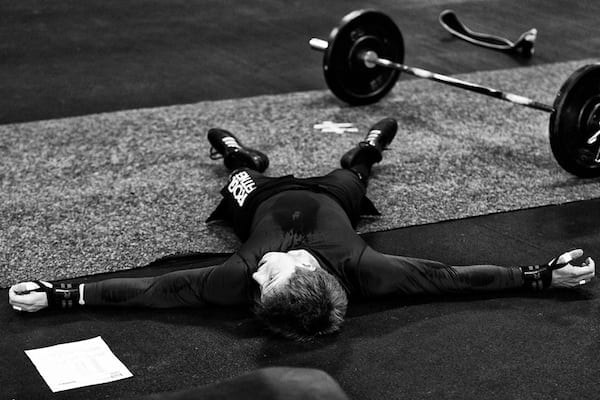No products in the cart.
Is Cortisol Ruining your Gains? – Reduce Stress & Gain Muscle

Cortisol is a steroid hormone which is produced in the adrenal gland. It has many benefits to the body but can also cause a lot of issues.
Cortisol is released in response to stress and is designed to help the body cope with this stress. This can be any form of stress, such as psychological stress, or physical (such as exercise).
One of the major disadvantages of cortisol is that it is a catabolic hormone. This means that it can break down muscle tissue and reduce protein synthesis.
If you are lifting weights then you will probably be aware that this is the exact opposite of the desired result. Because of this, lots of lifters have looked for ways to reduce cortisol.
One belief that arose in the 90s was that too much exercise could lead to increased cortisol production. And that this would lead to muscle loss. An absolute nightmare situation where the more you lift, the more muscle you lost was presented to amateur bodybuilders and gym lovers.
The presented solution was to stop exercising after 60 minutes because this was when cortisol started to be produced. In an article for SimplyShredded.com Layne Norton debunked this myth [1].
He pointed out that:
1) Cortisol is not a fast-acting hormone-like Insulin. It takes months of build up for cortisol to create a change in the body
2) It is not the duration of your workout that affects cortisol production. Rather it is exercise intensity. A 10 minute HIIT session is probably going to produce more cortisol than a 60-minute treadmill walk!
3) He pointed to a study that showed that increased cortisol was correlated with increased muscle mass!
How can that be? Cortisol is absolutely a catabolic hormone. So how can it be correlated with increased muscle mass, when science tells us that more cortisol should lead to less muscle? [toc]
Cortisol and Exercise

The study was published in the European Journal of Applied Physiology (2012) and was run by Daniel West and Stuart Phillips [2]. They found that the cross-sectional area of muscles (basically muscle size) and lean body mass (muscle mass) were weakly correlated with cortisol production related to exercise.
The reason for this is not that cortisol builds muscle. But that to increase cortisol you have to train at a higher intensity.
Think about it. If you are exercising for 90 minutes, yes your cortisol production will have increased (which can lead to muscle loss) but your training volume has also increased.
So even though there is a small negative effect. It is outweighed by the increased benefits of training harder and for longer. Obviously, there is a sweet spot, where increasing cortisol outweighs exercise benefit, but this may not be as low a threshold as people assume.
Daily Stress and Muscle Gains
But cortisol response to exercise is not the only way that cortisol can increase. It can also be affected by psychological stress or depression.
Chronic stress (such as from work, family, or financial) can cause a constant supply of cortisol.
This can affect you in a variety of ways. Raised cortisol can lead to bad sleep, which can lead to weight gain and reduced testosterone levels. Reduced testosterone means that you won’t be able to recover from exercise properly.
Reduced testosterone means that your muscles won’t grow as fast or may not even grow at all. It can also lead to overtraining, and injury.
In an indirect way, chronic stress can lead to a reduction in muscle gains. But that’s not all. An increase in blood pressure, a reduction in metabolism, and an increase in the risk of metabolic diseases such as Type II diabetes, heart disease, and obesity are also a likely result for anyone suffering from chronic stress.
Medical Causes of Increased Cortisol
Of course, it isn’t just stress and exercise that can cause an increase in cortisol production.
Cushing’s syndrome which can be caused by either exogenous sources (usually medication for other diseases) or endogenous sources. These can be tumours in the adrenal gland or issues with your pituitary system.
Overtraining Leads to Increased Cortisol

Back to exercise-related cortisol. While we have pretty much debunked the issue of cortisol being an issue after 60 minutes (or Layne Norton has for us). This is not the only issue when it comes to exercise.
Firstly, while everything we said was correct about duration not being the issue. That is only up to a point.
Participating in exercise that is over 3 hours, or that involves inhuman levels of endurance (ironman triathlons for example) can lead to increased cortisol.
Another issue is overtraining, partly for the reason we just mentioned, but also because of the lack of recovery. Bad sleep, mental fatigue, and chronic stress are all issues that can arrive when you are overtraining.
Because of this cortisol production can increase in the same way that it would when you are suffering from mental stress.
It is important that you be on the lookout for signs of overtraining. Bad sleep, a lack of progress (or even regression) in your training, headaches, fatigue, depression, muscle soreness, and injury are all signs that you have been overtraining for too long. Fixing this should reverse all the issues.
How to Manage Cortisol Levels
The trick with training and life is not to avoid cortisol, that would be impossible, but wouldn’t even be a good idea. You need cortisol, and a lack of cortisol can lead to fatigue, dizziness, weight loss, muscle weakness, and mood changes [3].
You need to manage it so that you get enough cortisol to thrive. But not so much that your muscle mass is affected.
Exercise
45-90 minutes, however much time you need to get your session completed. Train 4-5 times per week
Recovery
Take 2-3 days rest each week to recover from training sessions.
You can participate in active rest. This is where you avoid the gym but still walk a lot, or perform a low-intensity exercise such as yoga.
Sleep
Hit your 8 hours each night, in fact, you may even want to consider increasing this further.
Studies have shown that people who exercise regularly can benefit from even more sleep.
Stress
It’s impossible to avoid stress completely, but you can change how you react to stress.
You can also look at ways to reduce stress in your life.
Exercising, sleeping, and eating healthier can all help. But looking at meditation, therapy, or even a change of job (if it is affecting your mental health it’s not worth the pay cheque) could make big differences. Smoking, alcohol or drug use can also lead to stress and mental health issues so consider dropping these too.
Lowering stress, improving recovery, exercising regularly, and sleeping more will all help reduce stress. And will all help you to build and maintain muscle.
Don’t worry too much about your training sessions leading to excess cortisol. That is unless you are literally spending hours in the gym.
Trying to copy a professional bodybuilder (who has help from testosterone, growth hormone, and other steroids) will not get you anywhere.
Our Final Tip for Muscle Gains
While this tip won’t lower stress or your cortisol levels, taking certain supplements can increase your ability to build muscle.
Click here to see which supplements are best for building muscle.

I do have a stressful job and sometimes feel like not exercising at all 🙁
When I do make myself I do feel better about myself.